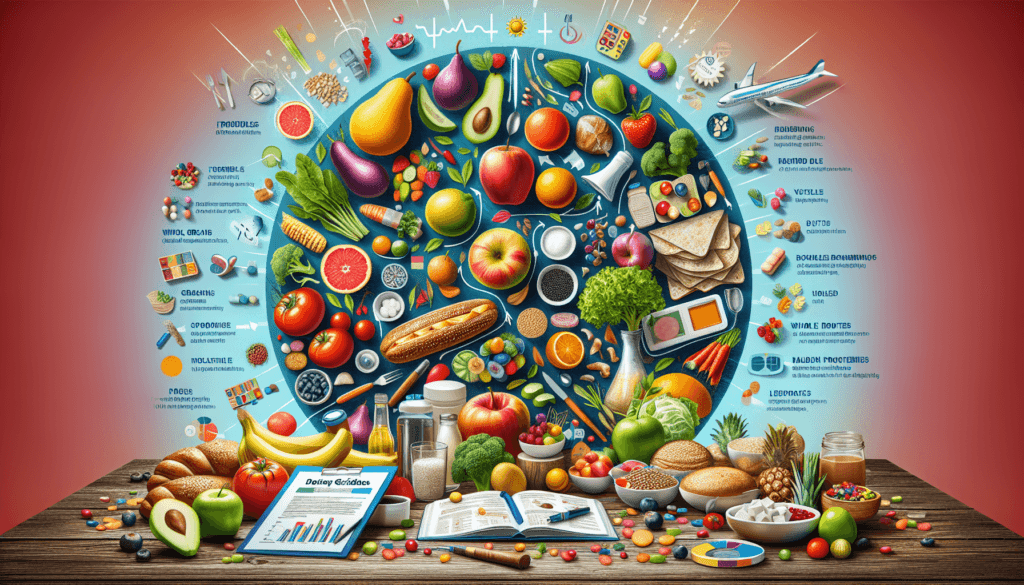In this article, you will discover the essential dietary guidelines designed specifically to help boomers manage diabetes effectively. Being a boomer and dealing with diabetes can be challenging, but by making some simple adjustments to your diet, you can take control of your health. We will explore the key principles of a diabetes-friendly diet, including the importance of portion control, carbohydrate management, and incorporating a variety of nutrient-rich foods into your meals. By following these guidelines, you can thrive and enjoy a fulfilling life while effectively managing your diabetes. So let’s embark on this journey towards better health together!
Dietary Guidelines for Managing Diabetes in Boomers

Understanding Diabetes in Boomers
As a boomer living with diabetes, it is important for you to have a clear understanding of what diabetes is and how it affects your body. Diabetes is a chronic condition that affects the way your body processes glucose, or blood sugar. In boomers, diabetes is often associated with the natural aging process and can be influenced by a combination of genetic and lifestyle factors. It is crucial to manage your diabetes effectively to prevent complications and maintain a good quality of life.
Basic Principles of Managing Diabetes
The key to managing diabetes lies in maintaining stable blood sugar levels. This can be achieved through a combination of healthy eating, regular physical activity, and, in some cases, medication or insulin therapy. It is important to work closely with your healthcare team to develop a personalized diabetes management plan that suits your needs and lifestyle. By adhering to basic principles such as monitoring your blood sugar, eating a balanced diet, staying active, and taking medications as prescribed, you can successfully manage your diabetes.
Carbohydrate Intake and Blood Sugar Control
Carbohydrates have the most significant impact on your blood sugar levels. It is important to be mindful of the types and amounts of carbohydrates you consume. Opt for complex carbohydrates such as whole grains, legumes, and fruits, which are digested more slowly and have a lesser effect on blood sugar. Additionally, be cautious of foods high in refined sugars and simple carbohydrates, such as sugary beverages, candies, and baked goods. Balancing your carbohydrate intake with protein and healthy fats can help stabilize your blood sugar levels throughout the day.
Fiber Intake and Digestive Health
Diabetes is often accompanied by digestive issues, such as constipation or diarrhea. Ensuring an adequate intake of dietary fiber can help regulate your digestive system and contribute to overall gut health. Fiber-rich foods include whole grains, fruits, vegetables, and legumes. Aim for a daily intake of at least 25-30 grams of fiber, spread out throughout the day. Remember to increase your fluid intake when consuming more fiber to avoid any discomfort or bloating.

Importance of Protein
Protein is a vital component of a balanced diet for managing diabetes. It helps in building and repairing tissues, maintaining a healthy weight, and regulating blood sugar levels. Incorporate lean sources of protein into your meals, such as poultry, fish, tofu, and legumes. It is recommended to have a serving of protein with each meal to promote satiety and stabilize your blood sugar levels. Consult with your healthcare team to determine the appropriate amount of protein for your individual needs.
Monitoring Fat Intake
While it is essential to moderate fat intake for overall health, it is especially important for individuals managing diabetes. Diets high in saturated and trans fats can increase the risk of heart disease, which is already elevated in people with diabetes. Instead, opt for healthy fats such as those found in avocados, nuts, seeds, and olive oil. These fats can provide essential nutrients while helping to maintain healthy cholesterol levels. Remember to practice moderation and portion control when consuming fats, as they are energy-dense.

The Role of Sodium in Diabetes
Managing your sodium intake is crucial for maintaining overall health with diabetes. High sodium intake can lead to increased blood pressure and put a strain on your cardiovascular system. To minimize the impact, limit your consumption of processed foods, which are often high in sodium. Instead, focus on fresh, whole foods and use herbs, spices, and low-sodium seasonings to enhance the flavor of your meals. By reducing your sodium intake, you can minimize the risk of complications and better manage your diabetes.
Choosing the Right Fats
While fat is an important part of your diet, not all fats are created equal. Opt for unsaturated fats, found in foods like avocados, nuts, and olive oil. These fats can improve cholesterol levels and reduce the risk of heart disease. On the other hand, saturated and trans fats, commonly found in fried and processed foods, can increase your risk of heart disease and pose a challenge to blood sugar control. Be mindful of your fat choices and strive for a balance that promotes overall health.

Vitamin and Mineral Requirements
Ensuring you meet your daily requirements for essential vitamins and minerals is crucial for managing diabetes. Some micronutrients, such as vitamin C, vitamin E, and chromium, may have benefits specific to diabetes management. To obtain these nutrients, focus on consuming a variety of fruits, vegetables, whole grains, and lean protein sources. Consult with your healthcare team to determine if you should consider any specific supplements to complement your dietary intake.
Hydration and Diabetes Management
Proper hydration is important for everyone, but it holds particular significance for individuals managing diabetes. Diabetes can increase the risk of dehydration, as high blood sugar levels can cause increased urination. Dehydration can lead to a range of issues, including dizziness, fatigue, and difficulty managing blood sugar levels. Ensure you drink enough fluids throughout the day and consider water, herbal teas, and sugar-free beverages as your main sources. Monitoring your urine color and frequency can also be helpful indicators of hydration status.
In conclusion, managing diabetes in boomers involves understanding the condition, adhering to basic principles of diabetes management, and making thoughtful dietary choices. By focusing on carbohydrate intake, fiber consumption, protein sources, fat choices, sodium levels, and hydration, you can effectively manage your blood sugar levels and promote overall health. Remember to work closely with your healthcare team to create a personalized plan that suits your individual needs and preferences. With dedication and a positive approach, you can successfully navigate the challenges of diabetes and enjoy a fulfilling and healthy life.



